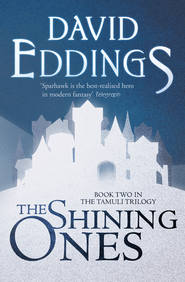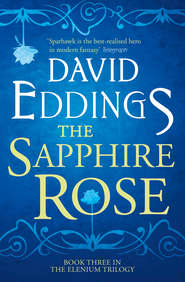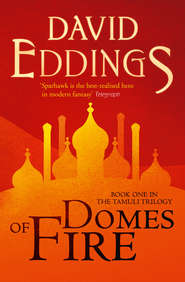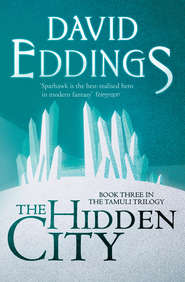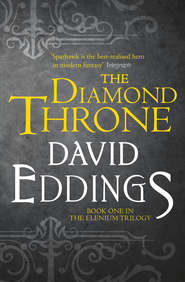По всем вопросам обращайтесь на: info@litportal.ru
(©) 2003-2024.
✖
The Rivan Codex: Ancient Texts of The Belgariad and The Malloreon
Автор
Год написания книги
2018
Настройки чтения
Размер шрифта
Высота строк
Поля
Anyway, this was about the time when the ESP fakers were announcing that they could bend keys (or crowbars, for all I know) with the power of their minds. Bingo! The Will and the Word was born. And it also eliminated the Superman problem. The notion that doing things with your mind exhausts you as much as doing them with your back was my easiest way out. You might be able to pick up a mountain with your mind, but you won’t be able to walk after you do it, I can guarantee that. It worked out quite well, and it made some interesting contributions to the story. We added the prohibition against ‘unmaking things’ later, and we had a workable form of magic with some nasty consequences attached if you broke the rules.
Now we had a story. Next came the question of how to tell it. My selection of Sir Perceval (Sir Dumb, if you prefer) sort of ruled out ‘High Style’. I can write in ‘High Style’ if necessary (see Mandorallen with his ‘thee’s, ‘thou’s and ‘foreasmuche’s), but Garion would have probably swallowed his tongue if he’d tried it. Moreover, magic, while not a commonplace, is present in our imaginary world, so I wanted to avoid all that ‘Gee whiz! Would you look at that!’ sort of reaction. I wanted language that was fairly colloquial (with a few cultural variations) to make the whole thing accessible to contemporary readers, but with just enough antique usages to give it a medieval flavor.
Among the literary theories I’d encountered in graduate school was Jung’s notion of archetypal myth. The application of this theory usually involves a scholar laboring mightily to find correspondences between current (and not so current) fiction and drama to link them to Greek mythology. (Did Hamlet really lust after his mother the way Oedipus did?) It occurred to me that archetypal myth might not be very useful in the evaluation of a story, but might it not work in its creation? I tried it, and it works. I planted more mythic fishhooks in the first couple of books of the Belgariad than you’ll find in any sporting goods store. I’ve said (too many times, probably) that if you read the first hundred pages of the Belgariad, I gotcha!! You won’t be able to put it down. The use of archetypal myth in the creation of fiction is the literary equivalent of peddling dope.
The preliminaries to the Belgariad are actually out of sequence here. The Personal History of Belgarath the Sorcerer was written after the rest of the studies while I was trying to get a better grip on the old boy. You might want to compare that very early character sketch with the opening chapters of the more recent Belgarath the Sorcerer. Did you notice the similarities? I thought I noticed you noticing.
When I first tackled these studies, I began with The Holy Books, and the most important of these is The Book of Alorn. When you get right down to it, that one contains the germ of the whole story. After that, I added The Book of Torak. Fair is fair, after all, and ‘equal time’ sounds sort of fair, I guess. The Testament of the Snake People was an exercise in showing off. (A poem in the shape of a snake? Gee!) The Hymn to Chaldan was supposed to help explain the Arends. A war god isn’t all that unusual.
The Marags are extinct, but that ‘equal time’ regulation was still in place, so I took a swing at the grief-stricken God Mara. I had fun with The Proverbs of Nedra – a sort of theological justification for pure greed. Maybe I’ll make a deal with the New York Stock Exchange, and they can engrave those proverbs on the wall.
The Sermon of Aldur was a false start, since it speaks glowingly of ‘Unmaking Things’, which UL prohibited in the next section. That section, The Book of Ulgo, was rather obviously based on The Book of Job. Note that I’ll even steal from the Bible. Gorim came off rather well, I thought. Incidentally, ‘UL’ was a typographical error the first time it appeared. I liked the way it looked on paper, so I kept it. (Would you prefer to have me claim ‘Divine Inspiration?’)
I’m going to disillusion some enthusiasts here, I’m afraid. Notice that the Mrin Codex and the Darine Codex aren’t included here. They don’t appear because they don’t exist. They’re a literary device and nothing more. (I once jokingly told Lester that I’d be willing to write the Mrin Codex if he’d agree to publish it on a scroll, but he declined.) I used the ‘Mrin’ as a form of exposition. Those periodic breakthroughs when Belkira and Beltira – or whoever else is handy – finally crack the code are the things that set off a new course of action. I catch hints of a religious yearning when people start pleading for copies of the ‘Mrin’. Sorry gang, I’m not in the business of creating new religions. This is ‘story’, not ‘revelation’. I’m a storyteller, not a Prophet of God. OK?
Once The Holy Books were out of the way, I was ready to tackle The Histories, and that’s where all the ‘ologies’ started showing up – along with a chronology. When you’ve got a story that lasts for seven thousand years, you’d better have a chronology and pay close attention to it, or you’re going to get lost somewhere in the 39th century. The histories of the Alorn Kingdoms are fairly central to the story, but it was the history of the Tolnedran Empire that filled in all the cracks. You’ll probably notice how tedious the Tolnedran History is. If you think reading it was tedious, try writing it. It was absolutely essential, however, since much of the background material grew out of it.
Most of the similarities between the people of this world and our imaginary one should be fairly obvious. The Sendars correspond to rural Englishmen, the Arends to Norman French, the Tolnedrans to Romans, the Chereks to Vikings, the Algars to Cossacks, the Ulgos to Jews, and the Angaraks to Hunnish-Mongolian-Muslim-Visigoths out to convert the world by the sword. I didn’t really have correspondences in mind for the Drasnians, Rivans, Marags, or Nyissans. They’re story elements and don’t need to derive from this world.
By the time we got to the histories of the Angarak Kingdoms, we were ready to dig into the story itself, so the Angaraks got fairly short shrift. I wanted to get on with it.
There were footnotes in the original of these studies, but they were included (with identifying single-spacing) in the body of the text. These are the mistaken perceptions of the scholars at the University of Tol Honeth. The footnotes I’m adding now are in their proper location (at the foot of the page, naturally). These later notes usually point out inconsistencies. Some of this material just didn’t work when we got into the actual narrative, and I’m not one to mess up a good story just for the sake of sticking to an out-dated game plan.
The addition of The Battle of Vo Mimbre was a sort of afterthought. I knew that epic fantasy derived from medieval romance, so just to re-enforce that point of origin, I wrote one. It has most of the elements of a good, rousing medieval romance – and all of its flaws. I’m still fairly sure that it would have made Eleanor of Aquitaine light up like a Christmas tree.
I wanted to use it in its original form as the Prologue for Queen of Sorcery, but Lester del Rey said, ‘NO!’ A twenty-seven page prologue didn’t thrill him. That’s when I learned one of the rules. A prologue does not exceed eight pages. Lester finally settled the argument by announcing that if I wrote an overly long prologue, he’d cut it down with a dull axe.
Oh, there was another argument a bit earlier. Lester didn’t like ‘Aloria’. He wanted to call it ‘Alornia’!!! I almost exploded, but my wife calmly took the telephone away from me and sweetly said, ‘Lester, dear, “Alornia” sounds sort of like a cookie to me.’ (Alornia Doone?) Lester thought about that for a moment. ‘It does, sort of, doesn’t it? OK, Aloria it is then.’ Our side won that one big-time.
I’m not passing along these gossipy little tales for the fun of it, people. There’s a point buried in most of them. The point to this one is the importance of the sound of names in High Fantasy. Would Launcelot impress you very much if his name were ‘Charlie’ or ‘Wilbur’? The bride of my youth spends hours concocting names. It was – and still is – her specialty. (She’s also very good at deleting junk and coming up with great endings.) I can manufacture names if I have to, but hers are better. Incidentally, that ‘Gar’ at the center of ‘Belgarath’, ‘Polgara’, and ‘Garion’ derives from proto-Indo European. Linguists have been amusing themselves for years backtracking their way to the original language spoken by the barbarians who came wandering off the steppes of Central Asia twelve thousand or so years ago. ‘Gar’ meant ‘Spear’ back in those days. Isn’t that interesting?
When the preliminary studies were finished, my collaborator and I hammered together an outline, reviewed our character sketches, and we got started. When we had a first draft of what we thought was going to be Book I completed, I sent a proposal, complete with the overall outline, to Ballantine Books, and, naturally, the Post Office Department lost it. After six months, I sent a snippy note to Ballantine. ‘At least you could have had the decency to say no.’ They replied, ‘Gee, we never got your proposal.’ I had almost dumped the whole idea of the series because of the gross negligence of my government. I sent the proposal off again. Lester liked it, and we signed a contract. Now we were getting paid for this, so we started to concentrate.
Incidentally, my original proposal envisioned a trilogy – three books tentatively titled Garion, Ce’Nedra, and Kal Torak. That notion tumbled down around my ears when Lester explained the realities of the American publishing business to me. B. Dalton and Walden-books had limits on genre fiction, and those two chains ruled the world. At that time, they wanted genre fiction to be paperbacks priced at under three dollars, and thus no more than 300 pages.
‘This is what we’re going to do,’ Lester told me. (Notice that ‘we’. He didn’t really mean ‘we’; he meant me.) ‘We’re going to break it up into five books instead of three.’ My original game plan went out the window. I choked and went on. The chess-piece titles, incidentally, were Lester’s idea. I didn’t like that one very much either. I wanted to call Book V In the Tomb of the One-Eyed God. I thought that had a nice ring to it but Lester patiently explained that a title that long wouldn’t leave any room for a cover illustration. I was losing a lot of arguments here. Lester favored the bulldozer approach to his writers, though, so he ran over me fairly often.
I did win one, though – I think. Lester had told me that ‘Fantasy fiction is the prissiest of all art-forms.’ I knew that he was wrong on that one. I’ve read the works from which contemporary fantasy has descended, and ‘prissy’ is a wildly inappropriate description (derived, no doubt, from Tennyson and Tolkien). I set out to delicately suggest that girls did, in fact, exist below the neck. I’ll admit that I lost a few rounds, but I think I managed to present a story that suggested that there are some differences between boys and girls, and that most people find that sort of interesting.
All right, ‘Time Out’. For those of you who intend to follow my path, here’s what you should do. Get an education first. You’re not qualified to write epic fantasy until you’ve been exposed to medieval romance. As I said earlier, there are all kinds of medieval literature. Look at the Norse stuff. Try the German stories. (If you don’t want to read them, go see them on stage in Wagnerian operas.) Look at Finland, Russia, Ireland, Iceland, Arabia – even China or India. The urge to write and read High Fantasy seems to be fairly universal.
Next comes the practice writing. I started on contemporary novels – High Hunt and The Losers. (The publication date of The Losers is June 1992, but I wrote it back in the 1970s. It’s not strictly speaking a novel, but rather is an allegory, the one-eyed Indian is God, and Jake Flood is the Devil. Notice that I wrote it before we started the Belgariad.) If you’re serious about this, you have to write every day, even if it’s only for an hour. Scratch the words ‘week-end’ and ‘holiday’ out of your vocabulary. (If you’ve been very good, I might let you take a half-day off at Christmas.) Write a million or so words. Then burn them. Now you’re almost ready to start.
This is what I was talking about earlier when I suggested that most aspiring fantasists will lose heart fairly early on. I was in my mid-teens when I discovered that I was a writer. Notice that I didn’t say ‘wanted to be a writer’. ‘Want’ has almost nothing to do with it. It’s either there or it isn’t. If you happen to be one, you’re stuck with it. You’ll write whether you get paid for it or not. You won’t be able to help yourself. When it’s going well, it’s like reaching up into heaven and pulling down fire. It’s better than any dope you can buy. When it’s not going well, it’s much like giving birth to a baby elephant. You’ll probably notice the time lapse. I was forty before I wrote a pub-lishable book. A twenty-five year long apprenticeship doesn’t appeal to very many people.
The first thing a fantasist needs to do is to invent a world and draw a map. Do the map first. If you don’t, you’ll get lost, and picky readers with nothing better to do will gleefully point out your blunders.
Then do your preliminary studies and character sketches in great detail. Give yourself at least a year for this. Two would be better. Your ‘Quest’, your ‘Hero’, your form of magic, and your ‘races’ will probably grow out of these studies at some point. If you’re worried about how much this will interfere with a normal life, take up something else. If you decide to be a writer, your life involves sitting at your desk. This is what you do to the exclusion of all else, and there aren’t any guarantees. You can work on this religiously for fifty years and never get into print, so don’t quit your day-job.
It was about the time that we finished Book III of the Belgariad that we met Lester and Judy-Lynn del Rey in person. We all had dinner together, and I told Lester that I thought there was more story than we could cram into five books, so we might want to think about a second set. Lester expressed some interest. Judy-Lynn wanted to write a contract on a napkin. How’s that for acceptance?
We finished up the Belgariad, and then went back into ‘preliminaries’ mode. Our major problem with the Malloreon lay in the fact that we’d killed off the Devil at the end of the Belgariad. No villain; no story. The bad guys do have their uses, I suppose. Zandramas, in a rather obscure way, was a counter to Polgara. Pol, though central to the story as our mother figure, had been fairly subordinate in the Belgariad, and we wanted to move her to center stage. There are quite a few more significant female characters in the Malloreon than in the Belgariad. Zandramas (my wife’s brilliant name) is Torak’s heir as ‘Child of Dark’. She yearns for elevation, but I don’t think becoming a galaxy to replace the one that blew up was quite what she had in mind. The abduction of Prince Geran set off the obligatory quest, and abductions were commonplace in medieval romance (and in the real world of the Dark Ages as well), so we were still locked in our genre.
We had most of our main characters – good guys and bad guys – already in place, and I knew that Mallorea was somewhere off to the east, so I went back to the map-table and manufactured another continent and the bottom half of the one we already had. We got a lot of mileage out of Kal Zakath. That boy carried most of the Malloreon on his back. Then by way of thanks, we fed him to Cyradis, and she had him for lunch.
I’ll confess that I got carried away with The Mallorean Gospels. I wanted the Dals to be mystical, so I pulled out all the stops and wrote something verging on Biblical, but without the inconveniences of Judaism, Christianity, or Mohammedanism. What it all boiled down to was that the Dals could see the future, but so could Belgarath, if he paid attention to the Mrin Codex. The whole story reeks of prophecy – but nobody can be really sure what it means.
My now publicly exposed co-conspiratress and I have recently finished the second prequel to this story, and now if you want to push it, we’ve got a classic twelve-book epic. If twelve books were good enough for Homer, Virgil, and Milton, twelve is surely good enough for us. We are not going to tack on our version of The Odyssey to our already completed Iliad. The story’s complete as it stands. There aren’t going to be any more Garion stories. Period. End of discussion.
All right, that should be enough for students, and it’s probably enough to send those who’d like to try it for themselves screaming off into the woods in stark terror. I doubt that it’ll satisfy those who are interested in an in-depth biography of their favorite author, but you can’t win them all, I guess.
Are you up for some honesty here? Genre fiction is writing that’s done for money. Great art doesn’t do all that well in a commercial society. Nothing that Franz Kafka wrote ever appeared in print while he was alive. Miss Lonelyhearts sank without a ripple. Great literary art is difficult to read because you have to think when you read it, and most people would rather not.
Epic fantasy can be set in this world. You don’t have to create a new universe just to write one. My original ‘doodle’, however, put us off-world immediately. It’s probably that ‘off-world’ business in Tolkien that causes us to be lumped together with science fiction, and we have no business on the same rack with SF. SF writers are technology freaks who blithely ignore that footnote in Einstein’s theory of relativity which clearly states that when an object approaches the speed of light, its mass becomes infinite. (So much for warp-drive.) If old Buck Rogers hits the gas-pedal a little too hard, he’ll suddenly become the universe. Fantasists are magic and shining armor freaks who posit equally absurd notions with incantations, ‘the Will and the Word’, or other mumbo-jumbo. They want to build a better screwdriver, and we want to come up with a better incantation. They want to go into the future, and we want to go into the past. We write better stories than they do, though. They get all bogged down in telling you how the watch works; we just tell you what time it is and go on with the story. SF and fantasy shouldn’t even speak to each other, but try explaining that to a book-store manager. Try explaining it to a publisher. Forget it.
One last gloomy note. If something doesn’t work, dump it – even if it means that you have to rip up several hundred pages and a half-year’s work. More stories are ruined by the writer’s stubborn attachment to his own overwrought prose than by almost anything else. Let your stuff cool off for a month and then read it critically. Forget that you wrote it, and read it as if you didn’t really like the guy who put it down in the first place. Then take a meat-axe to it. Let it cool down some more, and then read it again. If it still doesn’t work, get rid of it. Revision is the soul of good writing. It’s the story that counts, not your fondness for your own gushy prose. Accept your losses and move on.
All right, I’ll let you go for right now. We’ll talk some more later, but why don’t we let Belgarath take over for a while?
PREFACE: THE PERSONAL HISTORY OF BELGARATH THE SORCERER (#ulink_44bcb2c7-297b-597b-8738-4b61ea62388d)
(#litres_trial_promo)
In the light of all that has happened, this is most certainly a mistake. It would be far better to leave things as they are, with event and cause alike half-buried in the dust of forgotten years. If it were up to me, I would so leave them. I have, however, been so importuned by an undutiful daughter, so implored by a great (and many times over) grandson, and so cajoled by that tiny and willful creature who is his wife – a burden he will have to endure for all his days – that I must, if only to have some peace, set down the origins of the titanic events which have so rocked the world.
Few will understand this, and fewer still will acknowledge its truth. I am accustomed to that. But, since I alone know the beginning, the middle, and the end of these events, it is upon me to commit to perishable parchment and to ink that begins to fade before it even dries some ephemeral account of what happened and why.
Thus, let me begin this story as all stories are begun, at the beginning.
I was born in a village so small that it had no name.
(#litres_trial_promo) It lay, if I remember it correctly, on a pleasant green bank beside a small river that sparkled in the summer sun as if its surface were covered with jewels – and I would trade all the jewels I have ever owned or seen to sit beside that river again.
Our village was not rich, but in those days none were. The world was at peace, and our Gods walked among us and smiled upon us. We had enough to eat and huts to shelter us from the weather. I do not recall who our God was, nor his attributes, nor his totem. It was, after all, a very, very long time ago.
Like the other children, I played in the warm, dusty streets and ran through the long grass in the meadows and paddled in that sparkling river which was drowned by the eastern sea so many years ago that they are beyond counting.
My mother died when I was quite young. I remember that I cried about it for a very long time, though I must honestly admit that I can no longer even remember her face. I remember the gentleness of her hands and the warm smell of fresh-baked bread that came from her garments, but I can not remember her face – but then, there have been so many faces.
The people of my village cared for me and saw to it that I was fed and clothed and sheltered in one house or another, but I grew up wild. I never knew my father, and
my mother was dead, and I was not content with the simple, drowsy life of a small, unnamed village beside a sparkling river in a time when the world was very young. I began to wander out into the hills above my village, at first with only a stick and a sling, but later with more manly weapons – though I was still but a child.
And then came a day in early spring when the air was cool and the clouds raced overhead in the fresh, young wind, and I had climbed to the top of the highest hill to the west of our river. And I looked down at the tiny patch of dun-colored huts beside a small river that did not sparkle beneath the scudding clouds of spring. And then I turned and looked to the west at a vast grassland and white-topped mountains beyond and clouds roiling titanic in the grey sky. And I looked one last time at the village where I was born and where, had I not climbed that hill on just such a morning, I might well have died; and I turned my face to the west and I went from that place forever.
The summer was easy. The plain yielded food in plenty to a young adventurer with the legs to chase it and the appetite to eat it – no matter how tough or poorly cooked. And in the fall I came upon a vast encampment of people whitened as if by the touch of frost. They took me in and wept over me, and many came to touch me and to look at me, and they wept also. But one thing I found most strange. In the entire encampment there were no children, and to my young eyes the people seemed most terribly old. They spoke a language I did not understand, but they fed me and seemed to argue endlessly among themselves over who might have the privilege of keeping me in his tent or pavilion.
I passed the winter among these strange people, and, as is so frequently the case with the young, I learned nothing in that season. I can not remember even one word of the language they spoke.







